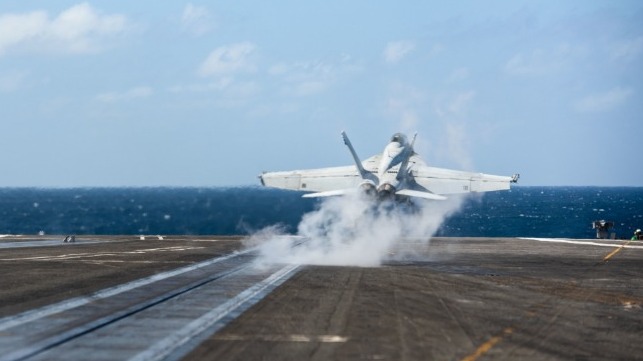U.S. Navy Resumes Rare Dual-Carrier Operations in South China Sea

The carriers USS Nimitz and USS Ronald Reagan have resumed side-by-side operations in the South China Sea as tensions between the United States and China continue to rise. This week, China's military has also deployed fighters to an airfield on disputed Woody Island in the nearby Paracel chain, open-source satellite imagery shows.
"Alongside like-minded regional partners, these efforts are in direct support of U.S. resolve to fly, sail, and operate wherever international law allows," said 7th Fleet commander Vice Adm. Bill Merz. "The capability and flexibility of our Navy is on full display as we support Indo-Pacific security and stability. There is no better example of our regional commitment, and periodically we will bring multiple teams together in 7th Fleet to practice large-scale coordinated operations."
USS Nimitz has been within the 7th Fleet AOR since June 17, and on July 4-6 she joined USS Reagan for a series of joint flight operation and air defense exercises. Air defense is the continued focus for their current exercises, the Navy said.
The last time that the Navy conducted a dual-carrier exercise in the region was in 2018, when the USS Ronald Reagan met up with the USS John C. Stennis for maneuvers in the Philippine Sea (not the South China Sea).
The move comes as the war of words between China and the United States over regional claims accelerates. On July 13, U.S. Secretary of State Mike Pompeo announced a significant change in American policy: the United States previously considered the area's maritime sovereignty disputes to be a matter for regional negotiation, but it now considers China's extralegal territorial seas claims to be broadly invalid.
"We are making clear: Beijing’s claims to offshore resources across most of the South China Sea are completely unlawful, as is its campaign of bullying to control them," Pompeo said in a statement. "The PRC has no legal grounds to unilaterally impose its will on the region. Beijing has offered no coherent legal basis for its 'Nine-Dashed Line' claim in the South China Sea since formally announcing it in 2009."
Pompeo cited the landmark 2016 decision of the Permanent Court of Arbitration in the Hague, which ruled unanimously in favor of the Philippines and found that China's South China Sea claims have no basis under the United Nations Convention on the Law of the Sea (UNCLOS).
In response, China has accused the United States of hypocrisy, noting that the U.S. has never signed UNCLOS and has withdrawn from many other international treaties when they do not serve the American interest.
"On the one hand, [the U.S.] dispatches large fleets of advanced military vessels and aircraft to the South China Sea to flex muscles and stir up troubles. On the other hand, it issued a statement aiming to undermine regional countries' efforts to uphold peace and stability in the South China Sea," asserted Chinese Foreign Ministry spokeswoman Hua Chunying on July 15. "The U.S. refuses to ratify the United Nations Convention on the Law of the Sea (UNCLOS), cannot stop itself from withdrawing from one international treaty and organization after another, and only chooses to comply with international law when the occasion serves its own interests."
The government of the Philippines, the nation most affected by expansionist Chinese activity in the South China Sea, has long downplayed the significance of the arbitral court ruling it won in 2016. Citing China's strength and the economic cost of a confrontation with Beijing, Philippine president Rodrigo Duterte has preferred to emphasize cooperation with China on trade and development.
However, Philippine foreign minister Theodoro Locsin appeared to shift direction in a statement July 12, calling the arbitral ruling a "non-negotiable" "milestone" favoring Philippine sovereignty. Two days later, Philippine defense secretary Delfin Lorenzana called on China to "heed the call of the community of nations to follow international law and honor existing international agreements," echoing Secretary Pompeo's message.
